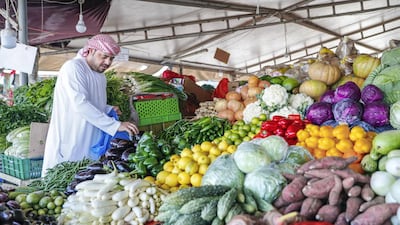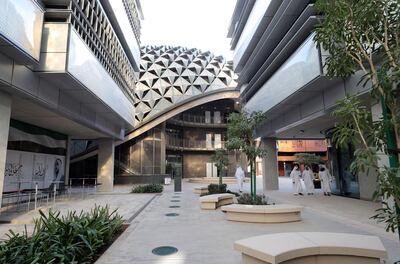This column is part of a series of exclusive insights ahead of Abu Dhabi Sustainability Week, being held from January 11-18, 2020.
A country's ability to act sustainably determines its successful development. In the context of food security, sustainability means enabling all citizens and residents to have access to sufficient nutritious food at affordable prices at all times.
As UAE Minister of State for Food Security, it is my duty to ensure that the UAE’s growing population is sufficiently fed and that the national food supply chain runs sustainably even during emergencies. This task will become all the more important as the population of the country is expected to grow to another million or so people over the next 20 years. When you take the UAE’s adverse crop growing conditions into account – its poor soil quality, shrinking groundwater levels, lack of arable land and low annual rainfall – it is not difficult to see that harvest to table is something of a challenge.
Thanks to the UAE leadership forming friendly relations with other governments, the country has created strong import supply chains that deliver 90 per cent of its total food. Although these have placed the country comfortably at the 21st place on the Global Food Security Index, it means that it remains vulnerable to global supply chain disruptions.

To reduce the UAE’s heavy reliance on food imports, in November 2018 my colleagues and I launched the National Food Security Strategy to take the UAE from its current place of 21 on the index to being among the top 10 by 2021 and number one by 2051. In devising the strategy, we were acutely aware that its success would depend on our ability to create meaningful partnerships that involve the community.
Initiating the strategy in the first few months meant finding suitable partners to help get it off the ground. A key pillar is enabling technology-based domestic food production, which has a target of increasing domestic yield by 30 per cent by 2021. One of the first things we did was to remove perceived barriers in adopting technology in this sector. In doing so, we engaged with private sector stakeholders to create 10 new initiatives in 100 days.
Now successfully launched, my office is focusing on involving the wider community in our efforts to advance food security. In September 2019, in partnership with Tamkeen, an Abu Dhabi-based company mandated to deliver projects to meet the UAE’s vision of knowledge-based development, we announced the FoodTech Challenge – a global competition to identify and implement sustainable and technology-driven solutions across the food value chain that enhance the UAE’s food security and self-sufficiency.
Launched by Sheikh Mohammed bin Rashid, Prime Minister and Ruler of Dubai, the challenge is open to all and invites the youth, entrepreneurs and innovators to find solutions across the food value chain to identify challenges in the UAE. There is a shared prize of $1 million for four winners – the largest ever offered for a food technology challenge. Winners will receive a host of benefits that include the opportunity to participate in a business incubation programme to translate their ideas into projects and connect with international investors.
With respect to creating a healthy population, the Food Security Office and the National Program for Happiness and Wellbeing in September 2019 launched the Nutrition Labelling Policy. This is a traffic light system for healthy and less healthy foods based on ingredients and nutritional value. Red, yellow and green labels indicate sugar, salt and fat content. This system of labelling foods is based on a study carried out by the Community Design for Wellbeing Initiative – another important partner helping us meet our goals.
Abu Dhabi Sustainability Week is essential to this concept of partnership. Masdar City is already an important ally in our efforts to create an advanced sector of agricultural technology – also known as “AgTech”– through its initiatives that include: the shipping container vertical farming project, aquaculture farming scheme and the smart home farming solution called ‘Bustani’. Each year the sustainability week raises awareness of the importance of sustainability in all spheres, including food security, and we wish this year’s programme every success. It is through partnering with key players in a sustainable manner that we can ensure the nation never faces a shortage of food.
Mariam Al Mheiri is the UAE's Minister of State for Food Security


